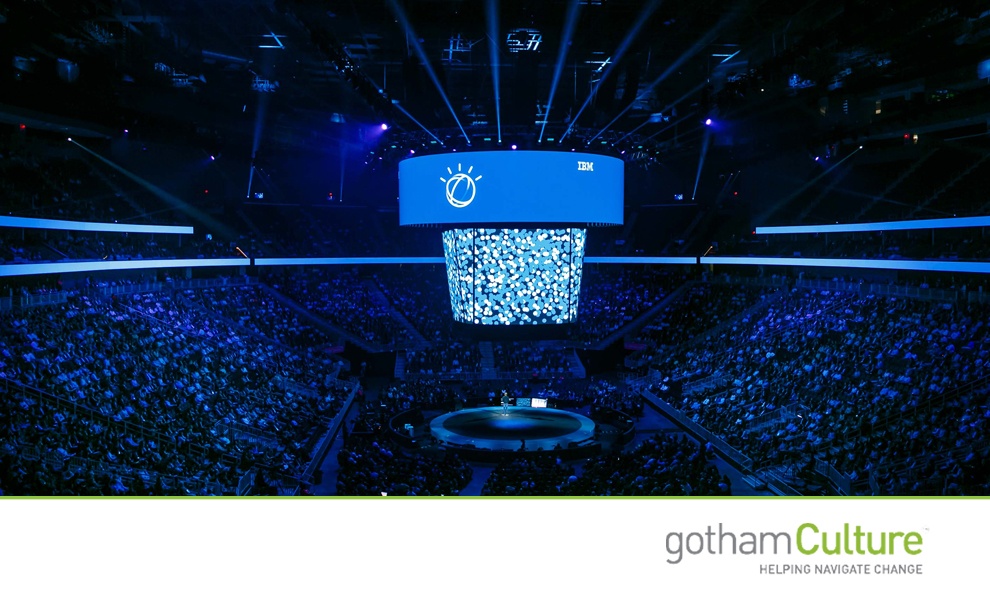They say what happens in Vegas stays in Vegas. But that would be a wild mistake if applied to this circumstance. If you’re a business leader or entrepreneur intent on staying competitive in the years to come, you’d best pay close attention.
Last month, IBM hosted the World of Watson conference in Las Vegas aimed at raising awareness and educating participants about advances in computing over the last decade. The gathering also showcased a wide variety of real-world use cases from IBM and their wide range of partners, including the likes of office supply retailer Staples, and Grammy-winning music producer Alex Da Kid. But how did we get to this point?
In 2007, when a small group of IBM’s artificial intelligence (AI) experts approached Dr. John Kelly III, SVP of Cognitive Solutions and Research, pitching authorization to build the world’s first cognitive computing system, he had a big decision to make. Some might say a gamble. But the company continued to put chips on the table to support this endeavor as it progressed exponentially over the last decade.
Cognitive technology is used in a variety of use cases across industries, the arts, and music; from winning a popular game show to helping oncologist boards determine cancer-fighting strategies. In a matter of five years, Watson progressed from Jeopardy winner to a technological capability that is available to everyone.
If you still aren’t convinced that cognitive technology is going to impact your life and business, think again. This isn’t a far-off vision of the future. It’s already happening. A few weeks ago I wrote about how Watson is beginning to change life as we know it, and there seems to be no end in sight.
In fact, Thomas Freidman, Pulitzer Prize-winning journalist and author of “The World is Flat” and “Thank You for Being Late”, suggests that cognitive technology is one of the three largest non-linear accelerations currently reshaping life and work as we know it (digital globalization and Mother Nature being the other two). Non-linear, meaning the line charts look akin to hockey sticks and they will undoubtedly have a significant impact on all of us.
Dr. Kelly agrees. Within the next five years, he expects every medical professional in the world will be utilizing the power of Watson to support decision-making, as well as enhancing the patient experience.
It’s Not All Rainbows and Unicorns
 Artificial intelligence and cognitive computing, as concepts, are not welcomed across the board. Many people view these advancements as encroaching on their livelihoods.
Artificial intelligence and cognitive computing, as concepts, are not welcomed across the board. Many people view these advancements as encroaching on their livelihoods.
IBM prefers the term ‘augmented intelligence’ over artificial intelligence. They believe that rather than computers taking over for humans, cognitive technology will serve a critical role in augmenting the humans it supports. This augmented intelligence will create unparalleled opportunities to draw out the full capacity and potential of the human spirit by relieving people of transactional and mundane tasks that take up so much time today.
So, What Does This Mean for Business Leaders?
- From data to insights. Imagine if you had the ability to consolidate and analyze massive amounts of structured data with lightning speed. Your data and insights were never forgotten. And a piece of technology could begin to learn through its interactions and proactively provide you with insights you need without even asking? I’m sure this possibility might intrigue more than a few business leaders.
- New opportunities and new markets. As the era of cognitive computing dawns and drafts off of the momentum that the cloud era created, a multitude of new business opportunities will emerge. Entrepreneurial thinkers will begin to conjure up new ways to solve problems using cognitive technology. Take, for instance, Local Motors, the startup behind the world’s first cognitive-enabled, autonomous vehicle, Olli.
- An enhanced way to serve your customers. Greg Spratto, VP of operations at Autodesk, shared with me an example of how his organization is using Watson to improve customer service. “Our agents typically get one of two types of inquiries from customers. The first being those related to accessing the information they need. In these situations, customers often don’t want to talk to a human being; they just want to get what they need so they can move on. By teaching Watson to interact with these customers and provide them with the information they need quickly and accurately, our service agents are now freed up to support the calls where customers truly need or want to talk with a human being.
- Helping free up your people to focus on work only humans can do. By freeing people from mundane or repeated tasks and augmenting them with technology to support rapid data analysis and insights, the human capital in your organization can spend more of their time creating and innovating; solving problems that computers cannot.
- The ability to keep pace with the world. The non-linear acceleration of technological advancement is quickly outpacing the ability of humans to adapt to these changes. Cognitive computing presents a way to help people effectively keep pace in a world that is continuously accelerating around them.
- An entirely new way of working together. Learning how to operate and thrive in this new world will take quite a bit of adaptation and time will tell how augmented intelligence will reshape the dynamics of the workplace.
I will continue to explore the cognitive era, as well as the potential impacts and risks tied to it. Whatever happens, it seems a new era of human existence may be upon us. The question is, how can we take advantage of the opportunity to augment the human experience at work?
Chris Cancialosi, Ph.D., is a Partner and Founder at gothamCulture. This article originally appeared on Forbes.
Culture Change is a Complex Process
Make sense of it with actionable advice from experts on the front lines.
You've successfully been added to our list. We're glad to have you!

